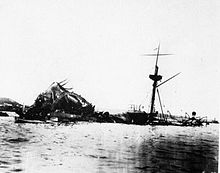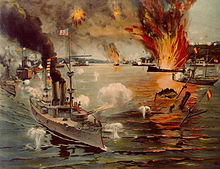 |
|
|
 |
The Battleship Maine
Eleven
days after the Cuban autonomous government took power, a small riot erupted in Havana. The
riot was thought to be ignited by Spanish officers who were offended by the persistent newspaper criticism of General Valeriano
Weyler’s policies. McKinley sent the USS Maine to Havana to ensure the safety of American citizens and interests. The need for the U.S. to send Maine
to Havana had been expected for months. However the Spanish government was notified just 18 hours before its arrival, which was contrary to diplomatic
convention. Preparations for the possible conflict started in October 1897. President McKinley arranged for Maine to be
deployed to Key West, Florida, as a part of a larger, global
deployment of U.S. naval power to attack
simultaneously on several fronts if the war was not avoided. As Maine
left Florida, a large part of the North Atlantic Squadron was moved to Key
West and the Gulf of Mexico. Others
were also moved just off the shore of Lisbon.
And still others were moved to Hong Kong.
At 9:40
pm on February 15 1898, Maine sank in the harbor
after suffering a massive explosion.

|
| The sunken USS Maine |
More Information
For further and detail information on
the Spanish-American War,
click the following link . .
|
|
 |
|
|
 |
The Battle for Manila Bay
The first battle of the war between the American and
Spanish forces was at
Manila
Bay in the Philippines.
On 1 May, Commodore George Dewey, commanding
the
U.S. Navy's Asiatic Squadron aboard the USS
Olympia, in a matter of hours defeated a Spanish
squadron under
Admiral Patricio Montojo. Dewey
managed this with only nine wounded.

|
| The Battle of Manila Bay |
The Regiment
The Rough Riders
is the name bestowed on the 1st United States Volunteer Cavalry, raised in 1898 for
the Spanish-American War. Its first commander was Colonel Leonard Wood, a doctor
who served as the medical advisor for both the President and secretary of war. Wood's
second in command was former assistant secretary of the United States Navy, Theodore Roosevelt, a man who had pushed for American
involvement in Cuban independence. The United States Army was weakened and left
with little manpower after the American Civil War roughly thirty years prior. As
a result, President William McKinley called upon 1,250 volunteers to assist in the war efforts. The volunteers were gathered in four areas: Arizona, New
Mexico, Oklahoma and Texas.
They were gathered mainly from the southwest because it was a hot climate region
that the men were used to similar to that of Cuba
where they would be fighting. "The difficulty in organizing was not in selecting,
but in rejecting men." The allowed limit set for the volunteer cavalry men was
promptly met. They gathered a diverse bunch of men consisting of cowboys, gold or mining prospectors, hunters, gamblers, Native
Americans and college boys. All of these volunteers were able-bodied and capable
on horseback and in shooting. Among these men were also police officers and military
veterans who wished to see action again. Men who had served in the normal army
during campaigns against Indians or served in the Civil War had been gathered to serve as higher ranking officers in the cavalry. In this regard they possessed the knowledge and experience to lead and train the men
well. As a whole, the unit would not be entirely inexperienced. Volunteers were gathered in San Antonio, Texas at the Menger Hotel Bar. When Colonel
Wood became commander of the 2nd Cavalry Brigade, the Rough Riders then became "Roosevelt's
Rough Riders."
|
|



